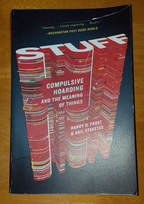
(This post is a review of the book, it is not meant to teach the details of hoarding nor how to work with someone who has Hoarding Disorder. An upcoming post will address some of those issues. For more information about hoarding consult the Institute for Challenging Disorganization, which offers a free Clutter Hoarding Scale publication and/or search for the Diagnostic and Statistical Manual of Mental Disorders (DSM-V) published by the American Psychiatric Association to learn about the criteria of Hoarding Disorder.)
The Stuff book is a compilation of case studies of people with Hoarding Disorder that the authors detailed from their professional work as professors and researchers of psychology. Frost and Steketee describe the lifestyle, living situation and psychological process of their many study subjects who exhibit Hoarding Disorder. The cluttered homes and spaces are described in detail. Conversations and thought processes of hoarders are recreated (direct quotes from discussions with hoarders in some cases) to try to understand the behaviors. The book describes how relationships are strained and, in fact, broken by this disorder. The authors offer possible causes of hoarding such as background (nurture), genetics (nature), traumatic events, and brain health. In each case the authors researched how the hoarding came about and how it progressed. Attempts at reducing the clutter by various professionals like social workers and professional organizers generally failed to fix the problem and often made the hoarding behavior and living situation worse. The authors found that the hoarder must be included as a participant in the decluttering process so that he learns as a result of the process how he might alter his hoarding behavior in the future.
On the positive side, through the observational descriptions, the reader gains great insight into hoarding disorder. And, in that respect, the book fulfilled my expectations. Anyone wanting to learn more about hoarding in general will find this insightful. Undoubtedly, hoarders and their loved ones will identify with some descriptions in the book. On the negative side, though each hoarding situation is unique, after a while the pattern emerges and feels repetitive. The book does not offer direct help in the form of checklists, or helpful questions to ask but it does provide the names of some helpful books and self-help groups. There is an extensive reference list of scientific studies, websites, books, and papers. It is definitely more of a scholarly work than a self help book. But, if you want to get a sense of how people live with Hoarding Disorder and how difficult it is to live with someone who suffers from it then this book is a good place to start.

 RSS Feed
RSS Feed
